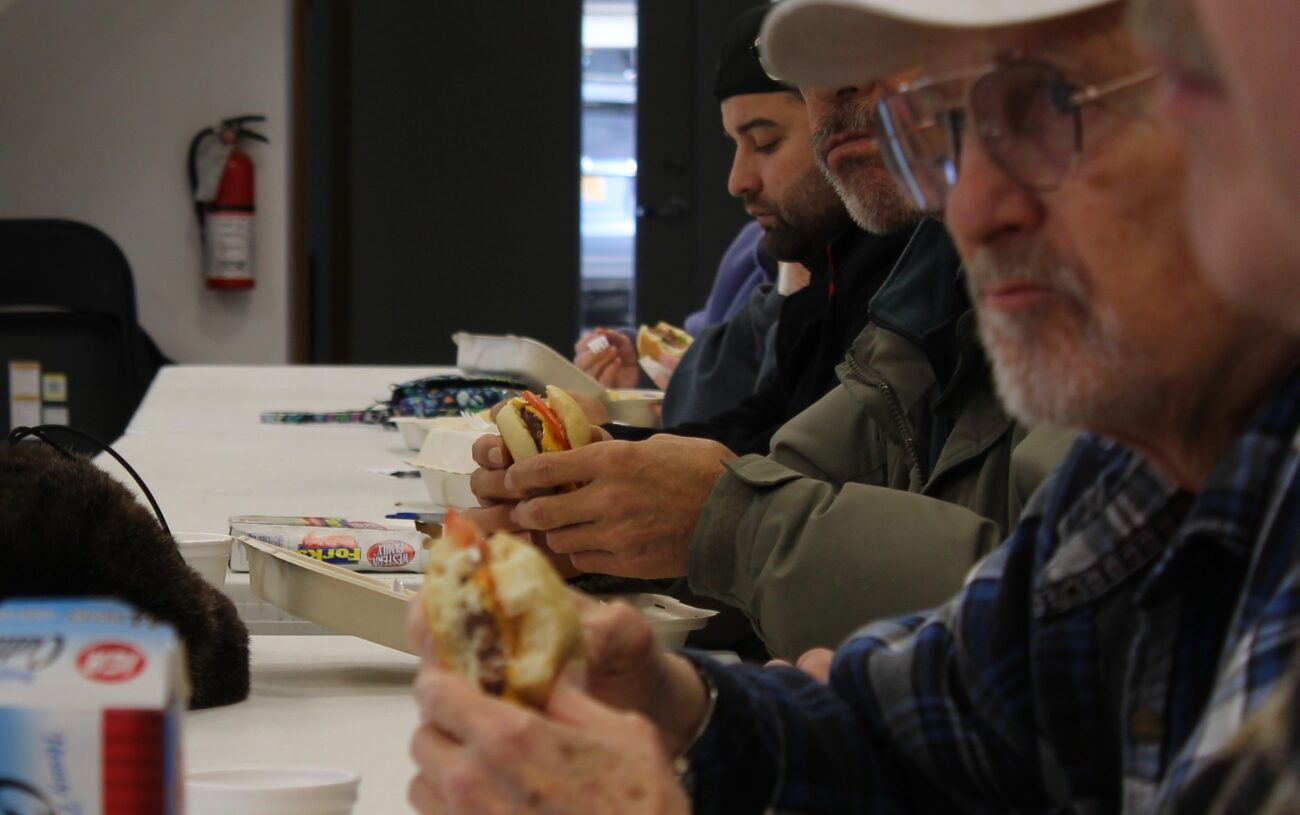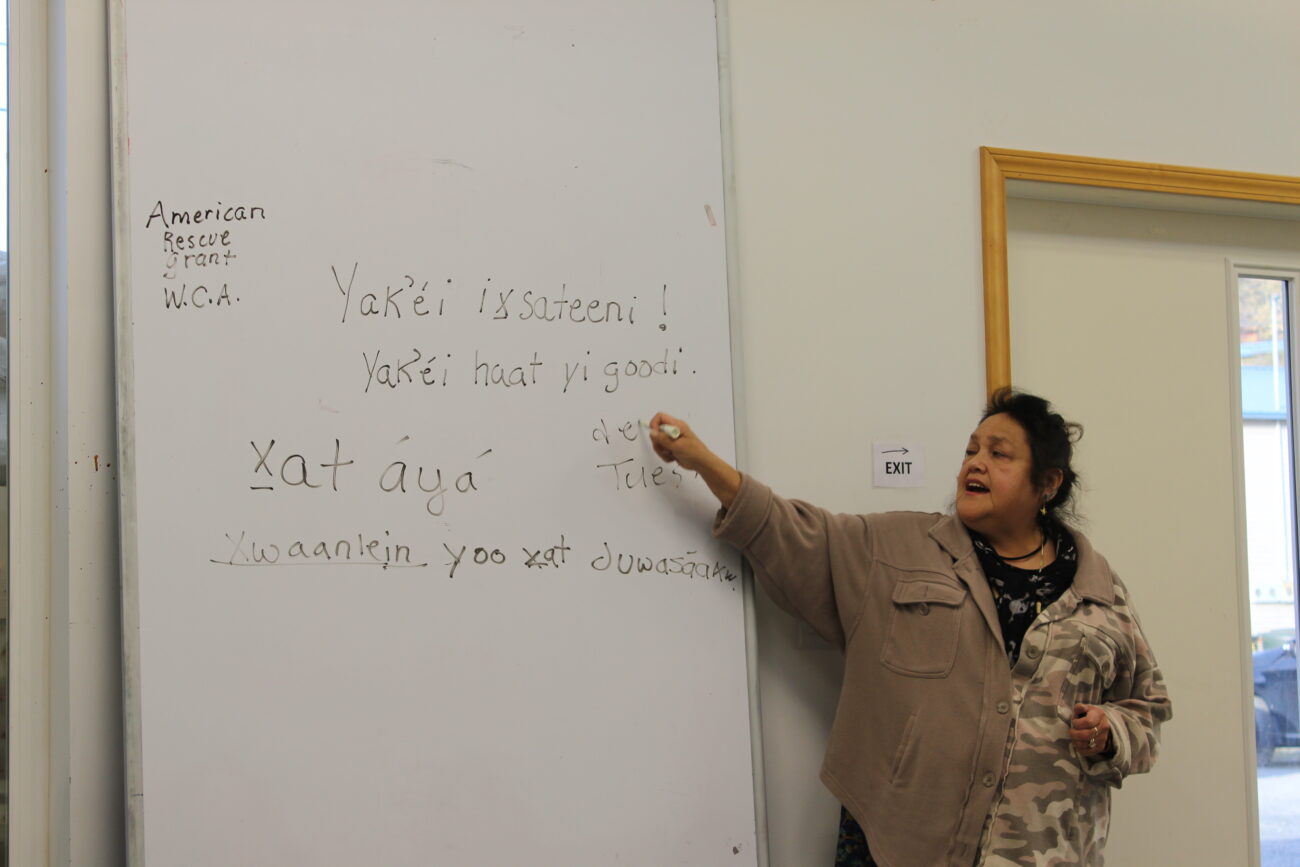
(Sage Smiley / 2022)
Some people use their lunchtime hour for eating. Others squeeze in a workout or a quick nap. And some Wrangell residents are using their lunchtimes to learn the critically endangered Lingít language – Wrangell’s tribe is sponsoring a year of beginning Lingít classes for adults.

(Sage Smiley / KSTK)
A good Lingít speaker will spray some spit, says Xwaanlein Virginia Oliver.
“X̲at áyá,” she says, “This is me, x̱at áyá and then my name Lingít x̱’éináx̱, in the Lingít language.”
Oliver stands in front of a tall whiteboard propped between windows at the tribal cultural center on Wrangell’s Front Street. She turns to the board, writing as she speaks.
“What I’m saying to you is ‘x̱at áyá’ and you see the high tones, x̱at áyá (your name) is me, Xwaanlein, that’s my name,” she explains.
Adults of all ages are scattered across two long rows of folding tables facing the board. Across the back of the room, behind the students, a weathered totem pole stretches the length of the building, awaiting restoration.
“X̲at áyá Xwaanlein, and then I would say ‘yoo x̱at duwasáakw,” Oliver continues. She looks around at the students. “I see all are your guys’s Lingít brains, your wheels grinding,” she jokes.
This lunchtime class (which took place November 8) is the first of a 37-week course put on by Wrangell’s tribal government. The Wrangell Cooperative Association’s (WCA) $82,000 federal grant will pay for almost a year of Lingít instruction and study materials, lunch for students, and travel for elders like Juneau-based Ḵaakal.áat Florence Marks Sheakley to come visit and share language, lead sewing classes, and play Lingít bingo. Sheakley has been a teacher at Wrangell’s recent summer culture camps for children, as well.
The focus of the first class is introductions.
“Culturally, we don’t introduce ourselves, just have to get that out of the way,” Oliver says. “Culturally, it is appropriate to have somebody else introduce you because you’re not supposed to be standing up there with a medal on your chest. The elders don’t like it. If you get on the stage too many times, they’ll tell you: ‘You’re up there too much now!’”
Returning to the proper formulation of an introduction, Oliver continues: “So you guys got the first part of that: ‘yoo x̱at duwasáakw.’ And then you’re either ‘gooch’ which is a wolf, or you’re ‘yeíl’ which is what? ‘Caw, caw’: a raven.”
“And so naax̱ is the moiety, the -x̱ is personalizing it to you,” Oliver says, writing more on the board. “Naax̱ and then x̱at is ‘me,’ sitee, and that means ‘it’s just so.’ Lingít haa sateeyí, that means ‘We’re all Lingít,’ say it. Lingít haa sateeyí.”
Put all together, the basic introduction flows thus: “X̲at áyá Lingít x̱’éináx̱ (Lingít name) yoo x̱at duwasáakw. (Gooch / Yeíl) naax̱ x̱at sitee.”
After introductions, Oliver moves to vowels, holding up laminated signs with vowel sounds and example words. For ‘é,’ the example is té: rock.
Over the next weeks, she says students will learn the whole Lingít alphabet.
“The most important thing about Lingít is learning the alphabet,” Oliver says. “Your teacher will tell you: ‘Tell them the vowels, tell them the alphabet.’”
Oliver says it’s been almost a decade since the community held adult Lingít classes. The last time was a cultural history revitalization project when language students recorded Lingít ‘Phrase of the week’ clips which air on local radio station KSTK throughout the year.
Wrangell public school students have opportunities to study Lingít, but tribal administrator Aaltséen Esther Reese says there wasn’t a public class in town for adults until now. Reese says before the pandemic, Oliver taught classes for the tribe.
“People were coming in saying, ‘Well, can we join, can we participate?’ And so we put this grant together to enable the adults in our community to come together, learn the Lingít language, learn a little bit more about the culture,” Reese explains. “We’re so lucky to have Virginia as a fluent Lingít speaker here. I always like to say we’re trying to raise more Virginias in town, so everyone here please be our next Virginia,” Reese says with a laugh.
Oliver says she’s doing what she can to preserve and grow “haa léelkʼu has yoo x̱ʼatángi, our grandparents’ language.”
She says she’s found after a while, the language flows easily: “Lingít is memorable. People remember, you remember this. That is the best thing that you’re going to do here is your memory. After a while, you’re going to start piecing it together. My kids in middle school learn how to say bad words about stuff just listening about this and that and I say ‘You said what?’”
She says the roots of words are important. Wrangell, Ḵaachx̱ana.áakʼw, sits at the mouth of the Stikine River, which is the anglicized version of Shtaxʼhéen – shtax’ meaning bitter, and héen meaning river.
“Never say you don’t know a Lingít word!” Oliver exclaims. “Héen. Héen at daná – drink it, Lingít,” she rhymes. “I’m telling you guys in the third person. Héen at daná, you drink. I’m telling you to drink it but if you’re drinking it you say ‘at x̱adaná,’ personalize it: ‘I am drinking, at x̱adaná.’ But if it’s hot, you sip it: ‘at x̱alóok.’ You can’t just drink it, you have to sip, x̱alóok.”
And the words aren’t just words, Oliver explains; Lingít is a very relational language. ‘Salt’ in Lingít is also the word for ‘ocean,’ and so on. The language carries the culture and history.
“Without the language the culture dies,” she says, gesturing to an illustrated poster resting on the totem pole at the back of the room; she explains: “Some of the clans are gone. Not from memory, I always put them on there [on the posters]. I’ve had people say ‘They’re not even here anymore. Why would you put them on there?’ Because to me, they were here.”
Oliver says she’s concerned about the death of Alaska Native languages.
“I was there the day that they announced that the last speaker of the Eyak language had died,” she says. “In the last years of her life, they didn’t teach anymore. They just recorded her. They recorded everything that she said or did. That’s all they did because she was gone. There’s no speakers of the language any more, and Lingít comes from Eyak.”
There’s also other personal motivation: “I don’t want to be the only one that can speak Lingít [in Wrangell],” she says. So, she teaches.
Oliver isn’t alone in that goal. Lingít language revitalization and recognition projects are underway all over Wrangell Island.
In addition to the funding for adult Lingít classes, Wrangell public school students have the opportunity to learn the language – and one Wrangell high school student has been producing a Lingít language and culture podcast. Wrangell’s tribe has also received money to replace the town’s road signs with dual-language markers. One of the local grocery stores also recently debuted Lingít signs for departments throughout the store.
And because of the lunchtime language class, there should be a growing group of Wrangell residents who can read, understand and translate the phrases scattered throughout town – the language persists.
Get in touch with KSTK at news@kstk.org or (907) 874-2345.









